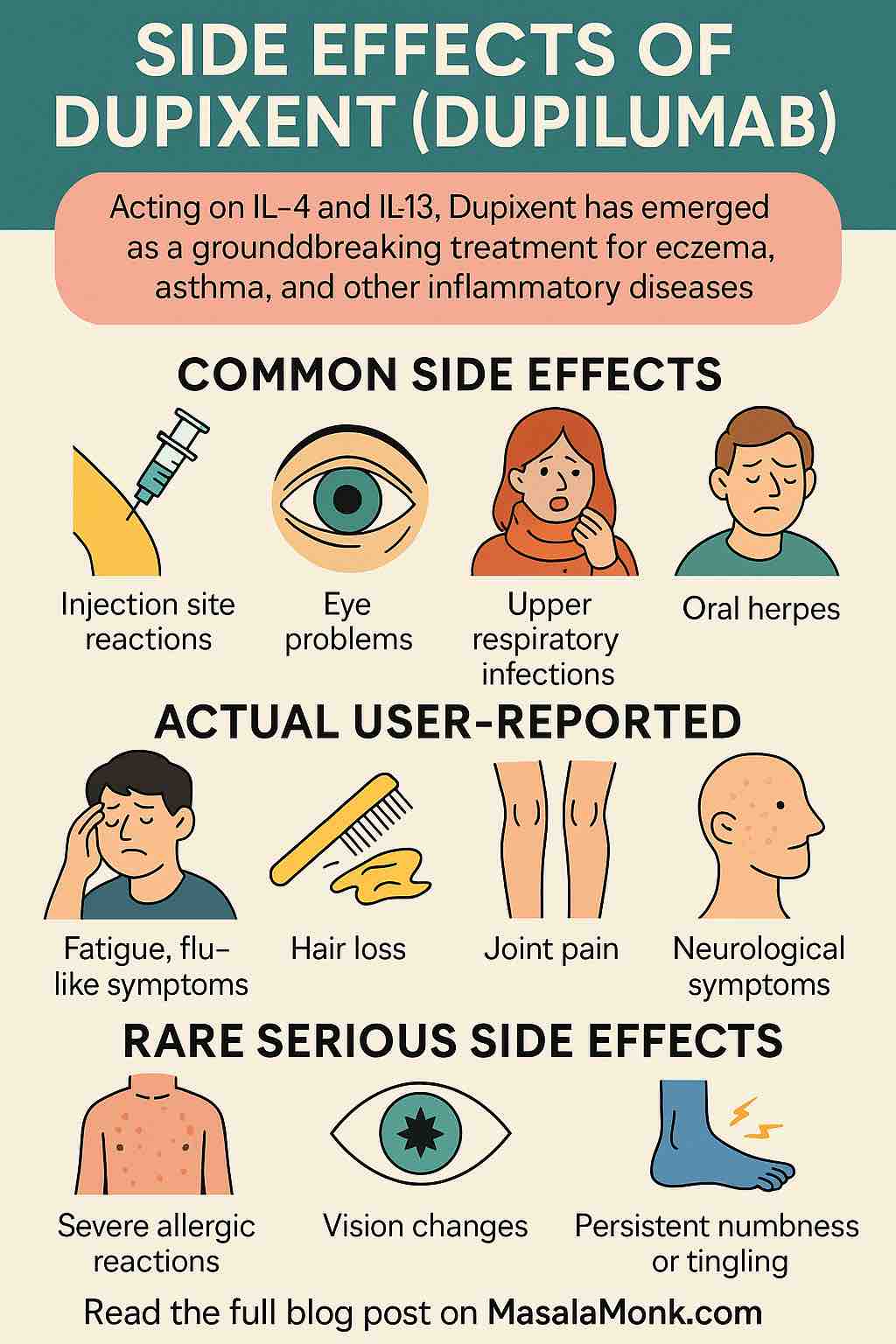
Dupixent (dupilumab) has been hailed as a game-changer for people suffering from severe eczema, asthma, and other chronic inflammatory diseases. Approved by the FDA in 2017, it’s given hope to millions—often where steroids and other immunosuppressants failed. But like any powerful medication, Dupixent doesn’t come without its side effects.
In this post, we’ll explore not just the textbook side effects from clinical trials, but the raw, real-world experiences shared by actual users on forums like Reddit and Drugs.com. Whether you’re just considering Dupixent or already on it and wondering what’s “normal,” this post is for you.
What Is Dupixent, and How Does It Work?
Dupixent is a monoclonal antibody that targets interleukin-4 (IL-4) and interleukin-13 (IL-13)—key drivers in the type 2 inflammatory response seen in conditions like:
- Atopic dermatitis (eczema)
- Asthma
- Chronic rhinosinusitis with nasal polyps (CRSwNP)
- Eosinophilic esophagitis (EoE)
- Prurigo nodularis
- COPD (in select patients)
By blocking these signals, Dupixent calms inflammation and restores skin and respiratory function without broadly suppressing the immune system.
Common Side Effects: What Clinical Trials Reveal
According to prescribing data and post-marketing surveillance, these side effects show up most often:
🔹 Injection Site Reactions
- Redness, swelling, or itching at the injection site
- Tip: Users often rotate sites or use cold packs before/after injections to minimize this.
🔹 Eye Problems
- Conjunctivitis (pink eye), dry eyes, and eyelid inflammation (blepharitis)
- This is especially common in eczema patients—up to 28% in some studies.
🔹 Upper Respiratory Infections
- Includes sore throat, congestion, and cough
- Often mild and resolves on its own
🔹 Oral Herpes Reactivation
- Cold sores may return or worsen in frequency
🔹 Elevated Eosinophils
- Increased white blood cells that can cause joint or lung symptoms in rare cases
🔹 Joint Pain and Muscle Aches
- More commonly reported in asthma and EoE patients
What the Internet Is Saying: Real User Experiences
Let’s go beyond the data sheet and listen to real users on platforms like Reddit’s r/eczeMABs, Drugs.com, and health forums.
👁️ “My Eyes Were on Fire”
“Dupixent cleared my skin like a miracle, but my eyes? Constant burning and crusting. I had to stop after 3 months.” – Reddit user
Commentary: Eye side effects are the #1 complaint across the board. Some find relief with over-the-counter drops, while others require prescription anti-inflammatory eye meds.
🩺 “It’s a Miracle… and a Curse?”
“I’ve never breathed this clearly. My eczema is gone. But I get these deep muscle aches and fatigue for a day or two after each shot.” – Drugs.com reviewer
Commentary: Some report post-injection fatigue or flu-like symptoms, likely due to immune system modulation.
😰 “My Anxiety Got Worse”
“I started having weird neurological symptoms—dizziness, pins and needles. My doctor isn’t sure if it’s Dupixent, but I didn’t have this before.” – Reddit user
Commentary: These symptoms are rare but not unheard of. It’s unclear whether Dupixent is directly to blame or if it unmasks underlying issues.
💇 “My Hair Fell Out”
“No one warned me about the hair loss. It started thinning around the temples after 6 months.” – Reddit user
Commentary: Hair thinning or texture changes have surfaced in anecdotal reports, but this is not yet a widely recognized clinical side effect.
Rare But Serious: When to Call Your Doctor
These are not common, but need immediate medical attention if they occur:
- Severe allergic reactions: hives, swelling of the face/throat, difficulty breathing
- Vision changes, eye pain, or loss of sight
- Severe joint pain or swelling
- Persistent numbness or tingling
Coping With the Side Effects
If you’re dealing with side effects but still benefiting from Dupixent, here are some ways to strike a balance:
- Work closely with your doctor: They may adjust dosing or recommend supportive treatments.
- See an ophthalmologist: Especially for recurring eye issues.
- Use a journal: Track symptoms weekly to identify patterns or triggers.
- Seek community support: Reddit, Facebook groups, and nationaleczema.org all have active, helpful communities.
Final Thoughts: Is Dupixent Worth It?
The overwhelming sentiment among users is this:
🟢 “It changed my life.”
🔴 “But it wasn’t without a price.”
Dupixent is not a casual medication. It’s a long-term commitment with potential trade-offs. For many, it offers dramatic relief that outweighs side effects. For others, especially those with eye issues or neurological symptoms, the cost may be too high.
Ultimately, the decision to start or stay on Dupixent is deeply personal—and best made in partnership with a healthcare provider who understands your condition and goals.
✍️ We Want to Hear From You!
Are you currently taking Dupixent? What’s your experience been like? Share in the comments.
Frequently Asked Questions (FAQs)
1. How long does it take for Dupixent to start working?
Most users begin seeing improvement in symptoms within 2 to 4 weeks, especially for eczema and asthma. However, for full therapeutic benefit, it may take 3 to 6 months of consistent use.
2. Are eye problems from Dupixent permanent?
Usually no. Most eye-related side effects (dryness, conjunctivitis, blepharitis) are temporary and manageable with eye drops or by consulting an ophthalmologist. In rare cases, symptoms may persist and require stopping the drug.
3. What should I do if I miss a dose of Dupixent?
Take the missed dose as soon as possible within 7 days of the scheduled date. If more than 7 days have passed, skip the missed dose and take the next one at your regular time. Never double dose.
4. Can Dupixent cause fatigue or flu-like symptoms?
Yes, some users report mild fatigue, headaches, or body aches, especially after injection days. These are typically short-lived but worth discussing with your doctor if persistent.
5. Is hair loss a known side effect of Dupixent?
Hair loss is not listed as an official side effect, but anecdotal reports from users suggest that it can occur. More research is needed to establish a direct link.
6. Does Dupixent affect the immune system?
Dupixent modulates part of the immune response (IL-4 and IL-13) but does not suppress the entire immune system like steroids or biologics used for rheumatoid arthritis. It’s considered relatively targeted and safe in that regard.
7. Can I take Dupixent during pregnancy?
Animal studies suggest no major risk, but human data is limited. If you are pregnant or planning to become pregnant, consult your healthcare provider to assess the risk/benefit ratio.
8. Are there any foods or medications I should avoid while on Dupixent?
There are no known major food or drug interactions with Dupixent. However, always inform your doctor about any new medications or supplements you are taking.
9. How long can I stay on Dupixent?
Dupixent is designed for long-term maintenance therapy, and some patients have used it for years. Regular check-ins with your healthcare provider help assess whether continued use is appropriate.
10. What should I do if I experience side effects?
Start by documenting the symptoms and discussing them with your doctor. For mild effects (e.g., dry eyes or rash), supportive care may help. For severe symptoms (e.g., vision loss, allergic reactions), seek medical attention immediately and consider discontinuing the medication under supervision.










